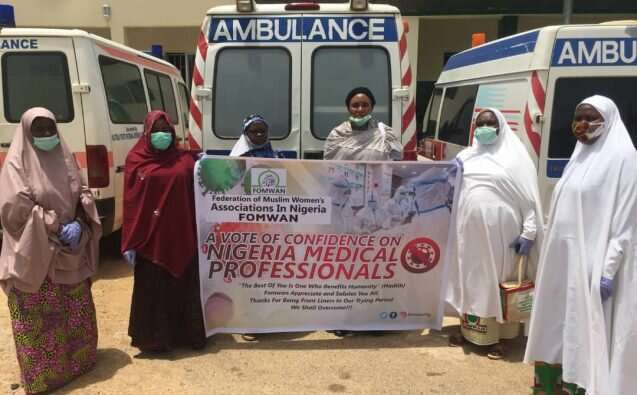How African feminists are helping to sustain peace in a pandemic

Throughout the COVID-19 crisis, African feminists have been essential in responding with care to the challenges facing their communities. COVID-19 cases are on the rise in Africa, but not at the exponential rate experienced in other parts of the world, suggesting the success of early prevention measures. Yet, grassroots feminists also point out that the pandemic has laid bare inequalities that have long been a reality—underscoring the urgent need for an approach to peace and security that is inclusive and broad in its scope.
In a series of webinars, the Women, Peace and Security program has convened grassroots women's organizations from Lesotho, Sudan, Nigeria, Uganda and Democratic Republic of Congo, to discuss their work in the context of COVID-19. On a recent call, these organizations, which are participating in the Peace and Social Change Fellowship, exchanged their strategies for addressing the impacts that the ongoing pandemic has had in their communities.
In the face of layered challenges in their communities, grassroots activists are engaged in developing new strategies and practices to forward and sustain peace—from advocating for attention to the gendered impacts of the crisis, to leveraging networks of mutual aid and digital activism to respond where government efforts fall short.
Using media as a mobilization tool
Women's organizations participating in the call cited digital activism as an increasingly useful tool during the pandemic. Several organizations have found innovative means to connect and organize across distances through media and technology.
The Federation of Muslim Women's Associations (Nigeria) and the Suubi Center (Uganda) has used radio and social media to spread awareness about COVID-19 prevention, promote compliance with social distancing measures, and highlight the pandemic's impacts on women's rights. In Sudan, activists from MANSAM, in addition to using traditional outreach methods, such as workshops and community dialogs—where permitted—also discussed the use of media to share drama and music containing health-related messages. In eastern DRC, the REFEADES team indicated that creating local digital platforms such as WhatsApp groups to communicate with other human rights activists has been critical.
Mamello Makhele, a midwife and advocate with the Barali Foundation in Lesotho, shared that that due to limited mobility, women and girls face increased difficulty in accessing healthcare and justice. In response, the Barali Foundation has used social media to connect with women and girls in need of a safe space. They initiated a Facebook campaign to amplify women's stories related to sexual violence and reproductive health.
Leveraging strategic partnerships
Facing challenges such as limited mobility, grassroots organizations have found that leveraging strategic partnerships is increasingly important to deliver essential services.
For example, leaders from the Suubi Center in Uganda mentioned that the government's ban on motorbike drivers—a primary source of transport in the region—from taking passengers has made women's access to health centers more difficult and dangerous. Sylvia Katooko, executive director of the Suubi Center in Uganda, is leveraging her position on local COVID-19 taskforce to draw attention to the particular gendered impacts of the crisis.
Meanwhile, other organizations built on their relationships with local stakeholders in order to sustain their activism. The Federation of Muslim Women's Associations of Nigeria (FOMWAN), for example, partners directly with religious leaders to connect more deeply with community members and raise awareness. The Barali Foundation is working with a collective of other local youth-led organizations to deliver needed items like children's clothes and menstrual hygiene products to families across the country. To do so, they partnered with organizations with essential services licenses to conduct the distribution.
Connecting structural issues: Climate change, health, and gender inequality
Grassroots activists also point to the intersections of the pandemic with structural issues such as climate change, healthcare inequities, and gender-based violence. A locust outbreak and recent flooding—both consequences of climate change—along with COVID-19 have presented a "triple threat" in several regions of the continent. Activists from Kenya, Uganda, and eastern DRC each cited recent episodes of flooding, resulting in displacement, food shortages, and increased burdens on women and girls.
"The [pandemic] has caused many problems [related to] poverty and hunger, and climate change aggravated the situation… People who are suffering in particular are women and girls," said Rose Faida, of REFEADES in eastern DRC. "Women who are producers and the pillars of the society find it difficult to work in that situation. A lot of women and girls turned to prostitution to cover their daily needs."
Activists also highlighted that some policies enacted by governments in response to COVID-19 often have had negative impacts on women's lives and health. The diversion of resources toward the virus, for example, has in some cases led to the de-prioritization of sexual and reproductive health, making access to these services more difficult to obtain.
Another common concern that grassroots activists expressed was the rise in cases of domestic violence in their communities, exacerbated by lockdown and shelter-in-place measures. In response, activists collectively discussed how to use this moment to advocate for more inclusive policies that prioritize gendered violence, expand women's economic power, and center women and girls' voices in decision-making.
Collective movement building across issues, localities and borders emerged as a primary means to achieve these goals. Sharing strategies and stories, and building opportunities for transnational collaboration, can pave a path toward a more just and peaceful post-pandemic future. As Ruth Ochieng, a co-facilitator of the fellowship program, said, "We need to rethink our strategies. Building cross-border collaboration as networks could be one of the ways. The more we are making noise, giving cross-country data, collaborating on campaigns, [we] will make an impact… Strength is in our numbers."
Provided by Earth Institute at Columbia University
This story is republished courtesy of Earth Institute, Columbia University http://blogs.ei.columbia.edu.





















